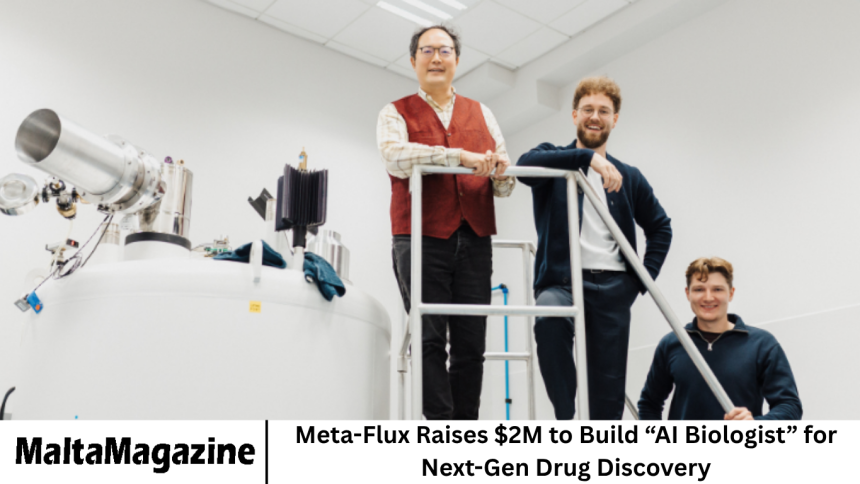The world of drug discovery is entering a new era — one driven by artificial intelligence, automation, and deep biological insights. Among the many ambitious biotech startups leading this transformation, Meta-Flux has emerged as a promising contender.
- The Drug Discovery Challenge
- What Is Meta-Flux’s “AI Biologist”?
- The $2 Million Funding and Its Significance
- Why Meta-Flux Stands Out
- The Impact on Drug Discovery
- Faster Target Identification
- Better Understanding of Mechanisms
- Reduced Experimental Waste
- Early Risk Detection
- Smarter Decision-Making
- Cost Efficiency
- Broader Disease Coverage
- The Broader Vision: Building a New Kind of Biotech
- Potential Challenges
- The Future of AI in Drug Discovery
- Frequently Asked Question
- Conclusion
The Dublin-based startup recently secured $2 million in seed funding to develop what it calls an “AI Biologist”, an advanced artificial intelligence platform designed to revolutionize the way scientists understand and design new drugs.
Meta-Flux’s vision goes beyond simply using AI for data analysis. The company aims to simulate biological reasoning, enabling computers to think like biologists — to interpret complex cellular interactions, predict drug responses, and identify promising targets much faster than traditional research methods.
More Read: Samsung reportedly set to expand foldable lineup with new trifold smartphone model
The Drug Discovery Challenge
Before understanding Meta-Flux’s solution, it’s important to grasp the challenges the pharmaceutical industry faces. Developing a new drug is one of the most time-consuming and expensive processes in modern science.
On average, it takes 10 to 15 years and costs over $1 billion to bring a single drug from concept to market. Even with such massive investments, more than 90% of drug candidates fail before reaching approval.
The main reasons behind these failures include:
- Incomplete understanding of disease biology
- Unexpected side effects or toxicity
- Poor translation from laboratory models to human biology
- Lack of reliable biomarkers or clear mechanisms of action
Most drug candidates fail in the preclinical stage, long before human trials begin. Scientists often rely on animal models and limited cellular data to make critical decisions — an approach that cannot fully capture human complexity.
This is where Meta-Flux steps in. The company’s mission is to build intelligent systems capable of reasoning about biology, predicting how living systems respond to treatments, and guiding scientists toward better choices early in the discovery process.
What Is Meta-Flux’s “AI Biologist”?
The term “AI Biologist” may sound futuristic, but it reflects a simple concept: creating an artificial system that can learn, reason, and hypothesize about biological data the same way a human scientist does.
Meta-Flux’s platform uses advanced AI algorithms to:
- Integrate biological data from multiple sources — such as genomics, proteomics, and clinical studies.
- Build models of biological systems — mapping relationships between genes, proteins, cells, and diseases.
- Simulate drug effects — predicting how a compound will influence various pathways, including potential side effects.
- Generate new insights — suggesting targets, mechanisms, or treatment strategies that might otherwise be overlooked.
Unlike many other AI tools in drug discovery, which focus only on molecule design or data screening, Meta-Flux’s platform aims to understand biology itself. It acts as a digital scientist that can propose ideas, test hypotheses virtually, and provide interpretable explanations for its conclusions.
This approach could save pharmaceutical companies enormous time and money while making early-stage drug research far more accurate and efficient.
The $2 Million Funding and Its Significance
Meta-Flux recently announced it had raised $2 million in seed funding to accelerate the development of its “AI Biologist” platform.
The funds will be used to:
- Expand the company’s research and development team
- Enhance AI models for broader disease coverage
- Partner with pharmaceutical and biotech firms for pilot projects
- Strengthen the company’s global presence and infrastructure
For a startup, a $2 million investment is significant because it provides the runway to build core technology, validate the product with early partners, and demonstrate real-world results.
This round also reflects growing investor confidence in AI-driven biotechnology, a field that has seen explosive growth in recent years. From molecule generation to clinical prediction models, AI is becoming an essential tool in drug development.
And Meta-Flux’s biology-first approach could position it as a key innovator in this emerging space.
Why Meta-Flux Stands Out
The biotech landscape is crowded with AI companies, but Meta-Flux’s unique strength lies in its focus on biological reasoning, not just data analysis.
Here are some aspects that make it stand out:
Biology-First Design
Most AI platforms in pharma start with chemical data or focus on virtual molecule design. Meta-Flux starts with biology itself — modelling cells, pathways, and interactions to understand diseases on a deeper level.
Interpretable AI
Rather than generating black-box predictions, Meta-Flux provides transparent reasoning behind its outputs. Scientists can see why a particular target or pathway was chosen, enabling better validation and trust in results.
Focus on Preclinical Stages
Meta-Flux targets the most uncertain phase of drug discovery — the preclinical stage, where early decisions determine future success or failure. Helping researchers make smarter go/no-go choices can dramatically reduce downstream costs.
Collaborative Approach
The company aims to work directly with pharmaceutical researchers, offering its AI as a decision-support tool rather than replacing human expertise. This balance of human and machine reasoning is key to effective innovation.
The Impact on Drug Discovery
Meta-Flux’s AI Biologist could transform nearly every stage of early drug development.
Faster Target Identification
By analyzing large biological datasets, the AI can identify potential drug targets faster than traditional laboratory screening.
Better Understanding of Mechanisms
AI can reveal complex cause-and-effect relationships between molecules, pathways, and diseases that humans might miss.
Reduced Experimental Waste
Meta-Flux’s simulations allow researchers to test hypotheses virtually before performing costly and time-consuming experiments.
Early Risk Detection
By predicting toxicity and side effects early, companies can avoid advancing risky candidates.
Smarter Decision-Making
With AI-generated reasoning, scientists can make more confident go/no-go decisions based on biological logic, not just data correlation.
Cost Efficiency
Reducing failed experiments and late-stage attrition can save companies millions in R&D expenses.
Broader Disease Coverage
Because Meta-Flux models entire systems, it can be applied across disease areas — from oncology to neurology to rare diseases.
The Broader Vision: Building a New Kind of Biotech
Meta-Flux’s ultimate goal is to redefine how the biotech industry approaches discovery. Instead of relying solely on trial and error, the company envisions a world where digital biology simulations play a central role in guiding every decision.
Imagine a future where:
- AI models can predict how a patient’s unique biology will respond to a drug.
- Researchers can test thousands of hypotheses in days rather than years.
- Drug design becomes faster, cheaper, and more precise.
Meta-Flux’s “AI Biologist” represents a step toward this vision — where machines help humans uncover biological truths at a scale and speed never before possible.
Potential Challenges
No groundbreaking technology comes without challenges, and Meta-Flux faces several of them:
- Data Complexity – Integrating biological data from various sources while maintaining accuracy and consistency is difficult.
- Validation – Convincing pharmaceutical companies to trust AI-driven predictions requires strong scientific proof.
- Competition – Other AI-driven drug discovery startups are emerging rapidly, all racing to prove their effectiveness.
- Scalability – Adapting the platform to different diseases and research areas will take time and resources.
- Regulatory Hurdles – Although Meta-Flux operates in early discovery stages, future regulatory considerations could arise as AI becomes part of drug development pipelines.
- Funding Needs – Continued innovation will likely require additional investment in the future.
Despite these challenges, Meta-Flux’s approach — blending biological insight with explainable AI — gives it a strong foundation for success.
The Future of AI in Drug Discovery
The intersection of AI and biotechnology is expected to grow exponentially in the coming decade. Analysts predict that AI-driven drug discovery could reduce development costs by up to 30% and accelerate timelines by several years.
AI will likely be used not only for data processing but also for generating scientific hypotheses, designing new molecules, and identifying personalized treatments based on patient-specific data.
Meta-Flux’s “AI Biologist” could serve as the blueprint for this new era — where AI doesn’t just assist scientists but actively reasons about biological systems, learns from them, and proposes new directions for research.
If successful, this technology could shorten the path from idea to treatment, bringing life-saving therapies to patients faster and at lower cost.
Frequently Asked Question
What is Meta-Flux?
Meta-Flux is a Dublin-based biotech startup focused on using artificial intelligence to improve drug discovery. It aims to build an “AI Biologist” — a platform that simulates biological reasoning to help scientists understand diseases and design better drugs.
What does the term “AI Biologist” mean?
The “AI Biologist” is an advanced AI system that can interpret biological data, predict drug responses, and generate insights similar to how a human biologist might reason through complex biological questions.
How much funding has Meta-Flux raised?
Meta-Flux has raised $2 million in seed funding to expand its team, develop its AI platform, and establish partnerships with pharmaceutical companies.
How will Meta-Flux’s technology help drug discovery?
The AI Biologist can integrate and analyze vast amounts of biological data to identify promising targets, predict drug outcomes, and suggest the best experimental strategies — all of which speed up the discovery process and reduce failure rates.
What makes Meta-Flux different from other AI drug discovery companies?
While many competitors focus on molecule design, Meta-Flux focuses on understanding biology itself. Its platform models the relationships between genes, proteins, and pathways, offering clear explanations for its predictions rather than black-box outputs.
What are the potential challenges Meta-Flux might face?
The company must overcome challenges like integrating diverse data, validating AI models for reliability, competing with other startups, and securing ongoing funding for long-term growth.
What is the future goal of Meta-Flux?
Meta-Flux aims to revolutionize preclinical research by providing tools that enable scientists to reason about biology digitally. Ultimately, it hopes to make drug discovery faster, cheaper, and more accurate — benefiting both pharmaceutical companies and patients.
Conclusion
Meta-Flux’s $2 million funding marks more than just a financial milestone — it represents a paradigm shift in how we approach drug discovery. By developing an “AI Biologist” capable of understanding biological systems, the company is pioneering a smarter, faster, and more insightful way to discover new medicines.
While challenges remain, the potential is immense. Meta-Flux’s combination of deep biological reasoning and artificial intelligence could help solve some of the biggest inefficiencies in pharmaceutical research.









